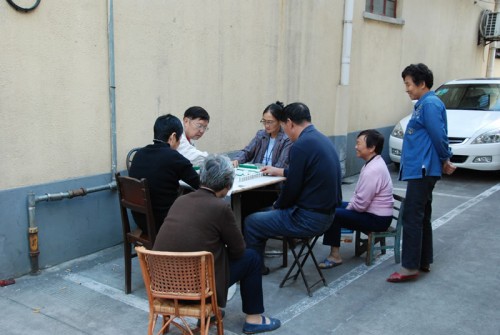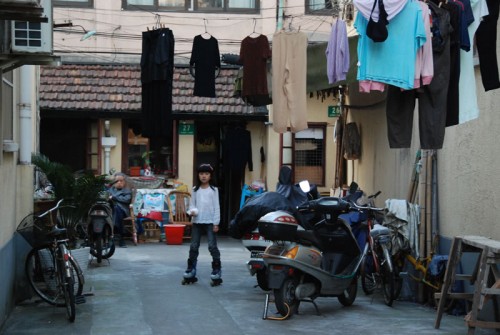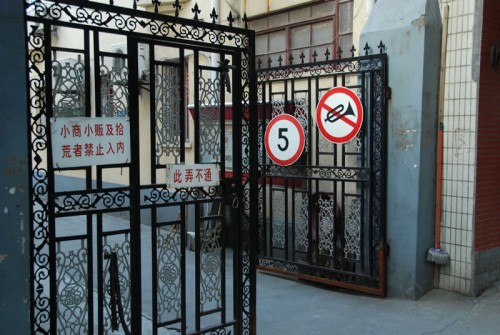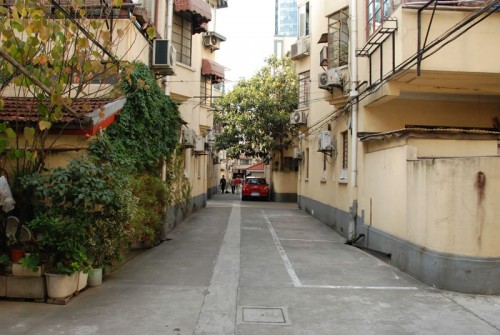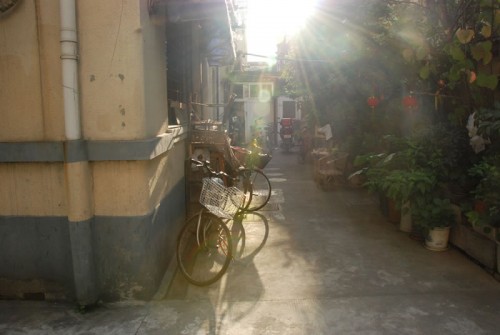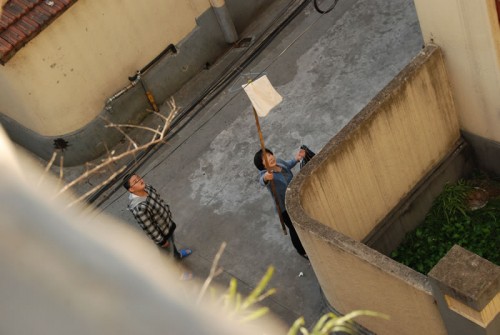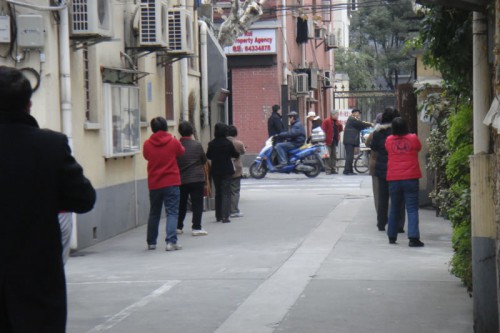Nelson™ says:
heh
he said
Chinese civilization is so old
thousands of years old
there must be something
behind all this
pre-modernity
惠静 HC,KL says:
uh huh
Nelson™ says:
what keeps chinese civilziation alive for so long
and
he proposes
to find out what it is, and dig it out and re-use it for modernity
惠静 HC,KL says:
orh
Nelson™ says:
which is
not really how i feel
but close
i think im more extreme
惠静 HC,KL says:
?
Nelson™ says:
i want china to reject modernity
惠静 HC,KL says:
复古?
Nelson™ says:
not even
but find a path for themselves
惠静 HC,KL says:
uh huh
Nelson™ says:
modernity is such an european idea
that has influenced the whole worlds
world*
惠静 HC,KL says:
orh
Nelson™ says:
sometimes i also think that USA
is not a country
but a vision for the world
惠静 HC,KL says:
uh huh
Nelson™ says:
that their manifesto requires them to impose their values on others
USA is not a country, but an idea of how the world should be
many races in one country
and have some sort of freedom and democracy
惠静 HC,KL says:
but
Nelson™ says:
and
Singapore adopted that model
before USA, countries/nations were always based on a racial/linguistic model
but i think the USA changed that
惠静 HC,KL says:
uh huh
Nelson™ says:
no wonder Malaysia rejected Singapore
lol
coz Malaysia still bases itself on the traditional model
not good or bad
just saying why its different
惠静 HC,KL says:
cos
sg threatens the malay powerbase
Nelson™ says:
yea
惠静 HC,KL says:
dunno who said, that’s why we incl sabah sarawak
Nelson™ says:
so in the world now there are kind of different kind of nations
some nations are still based on that linguistic/racial model
like China
Japan
Europe
then u have these multi-racial places like Singapore
USA
where else
惠静 HC,KL says:
canada?
Nelson™ says:
yea Canada
right
my indian friend used to make fun of Singapore
say
we are a man-made country
lol
惠静 HC,KL says:
uh huh
why that funny?
Nelson™ says:
dunno
sounds wrong
but i just laugh
惠静 HC,KL says:
orh
Nelson™ says:
i was like
all countries are made up by man, what is she saying
lol
but i think she meant artifical
惠静 HC,KL says:
uh huh
articifial meaning.
Nelson™ says:
so anyway
yea
modernization
also means
unification of all human races
did u know?
惠静 HC,KL says:
westernization
oh
Nelson™ says:
no
惠静 HC,KL says:
orh
Nelson™ says:
its a western idea of trying to unify the world into one global context
like saying
let there be one langauge that everyuone understands
one system that works
one standard
the A4 paper is a product of that modern system
now paper sizes are standardised in Europe
but i dont know if thats good for China
i dont know
惠静 HC,KL says:
china did the unification thing befor
long in history
one chian
Nelson™ says:
ye i know
惠静 HC,KL says:
*china
Nelson™ says:
but
this is different
惠静 HC,KL says:
why\
Nelson™ says:
its not about one china
its about one world
惠静 HC,KL says:
it’s the same.. no?
Nelson™ says:
no
it might mean the wiping out of chinese culture
惠静 HC,KL says:
not race-based
Nelson™ says:
did u ever study post modernism?
惠静 HC,KL says:
no
Nelson™ says:
thats why you have post-modernism in the west now
惠静 HC,KL says:
?
Nelson™ says:
where people reject all this ’standardization’
and homogenity
saying
惠静 HC,KL says:
uh huh
Nelson™ says:
it is detremental to culture
dont try to homogenize culture
dont make everything the same flavour
i want differences
i want chocolate
i want strawberry
dont make everything vanilla
惠静 HC,KL says:
well
it followed from
Nelson™ says:
of coz it is extreme
惠静 HC,KL says:
indus. rev.
Nelson™ says:
but they have a point there
dont give me one size fits all
i want customization
惠静 HC,KL says:
but if u follow the times from industrial revolution
ppl kept growing
more and more ppl in the world
Nelson™ says:
uh huh
惠静 HC,KL says:
w/o mass production
it’s not possible to sustain a lot of things
*s
Nelson™ says:
yes
惠静 HC,KL says:
resources
Nelson™ says:
but then it becomes
utility over culture
惠静 HC,KL says:
mm
men are ruled by what they created
Nelson™ says:
its like saying
we dont need flavours
just
eat a pill
and u are full
惠静 HC,KL says:
uh huh
Nelson™ says:
thats good enough
what for have to chew and taste
惠静 HC,KL says:
to survive?
yes that’s what astronauts do
Nelson™ says:
thats what u;re saying
its kind of existential
and i reject that
惠静 HC,KL says:
but
Nelson™ says:
i think life is more than just surviving
惠静 HC,KL says:
uh huh
Nelson™ says:
u dont eat to live, u live to eat
lol
惠静 HC,KL says:
mm
existential meaning
Nelson™ says:
this sounds like ur existential paper liao
惠静 HC,KL says:
that can only said in today times
orh
as in u said urself exist. only came in the 20th centur
Nelson™ says:
orh
惠静 HC,KL says:
was it always live to eat or did ppl change there too
Nelson™ says:
yes and no
industrialization allowed people to have free time on such a big scale
but i believe before industrialization
the rich people and aristocrats always had free time
惠静 HC,KL says:
uh huh
Nelson™ says:
but it was just a minority
u know when u walk into a department store
惠静 HC,KL says:
then the poor ppl eat to live?
Nelson™ says:
and those people will treat u like King
as a customer
thats the kind of treatment only aristocrats got back in the day
patrons of these exclusive stores
but industrialization changed all that
now eevryone wants to be treated like a exclusive patron
lol
惠静 HC,KL says:
uh huh
Nelson™ says:
yea poor people probably eat to live
i think
i dunno
maybe i should be really poor for a while
to find out
if i change
惠静 HC,KL says:
orh
Nelson™ says:
then i will stop thinking about all this
and think about food all day
Uncategorized
There are traffic lights in Shanghai, and there are road lanes too. But one wonders why they even need it when no one follows them. The cars and bicycles do not stop for the red, and the people never care to wait for the green. There is a certain madness and chaos that goes on everyday on the roads of Shanghai, one that is different from New York, but I have yet to witness an accident. And so life goes on within this chaos, and the individual survives in a self-reliant way; it is Darwinism being played out on an everyday basis, and only the strong prevail.
Allow me to elaborate a little more. When one tries to cross a junction, and does so when the light is green, he will realize that the cars and bicycles continue to pass through, and in an unmerciful and obstinate way. Likewise, the pedestrains cross during the red light too, disregarding the traffic but only caring for their destination and their safety. As such, the people are really good at avoiding cars and crossing the road spontaneously whenever they see a chance, and the cars are also excellent at swerving through crowds of people and not causing any accidents. But one has to be forceful and aggressive in order to move forward on the road, because if you give way to others, no one will give way to you. I was once stuck at a zebra crossing for half an hour because none of the cars would stop for me, and i should have known since they don’t even stop for the red light.
This same principle is also observed in subway stations, especially in the morning and the weekends, when swarms of people rush into trains and into the bottleneck of escalators. If you’re not pushing your way through, you will never get into the train or get on the escalator, and people will just cut in front of you with no mercy. People in Shanghai walk really fast, and they charge through crowds; sometimes one thinks that the subway station is a good place for soccer or basketball dribbling practice because you have to learn to meander and cut through the gaps in order to proceed forward. It is again the same for hailing cabs, where people will cut the line or steal your cabs even if you came before them. Such is the way of life here, where everyone fends for himself, watches his own back, and somehow it works out.
But there is also a certain sense of selfishness that comes out of this, a self-preservation attitude that only cares about saving one’s own skin without care for others. It’s sort of a mentality that arises from a lack of resources, where if only 3 people out of 10 people are getting something, then I will make sure that I am one of the 3, and too bad for the other 7. Should people step back and try to access the situation from a larger perspective and say, hey we should worry about the other 7 too, and take care of those around us? I wonder. But perhaps China has always been a place where there is not enough of anything, and too much people, thus giving birth to this sort of self-centered attitude.
No wonder Chinese people rejected Han Fei Tse’s teachings of law and restrictions. No wonder Chinese people never liked rules and regulations. They hate being boxed in, hate having lines drawn. Whatever boundary that you might have, the Chinese have found a way to break it regardless, or go around it. It’s ironic when people say the Chinese lack creativity, because I think they actually have a capacity to overcome anything with their strong sense of survival and disregard for boundaries. And yet because the Chinese civilization is so stubborn and formidable, their government has always tried to tame them with standards, from the time of Qin Shihuang to the present of the Communist government. But try as they might, they have never fully controlled or contained this wilful spirit. And things will change even more now, with the introduction of the internet, as divisions are collapsed and new networks are formed, which is resulting in the loss of media control by the government.
I had a conversation about television programs in China, and the thing that I noted was the abundance of war-related serial dramas on many channels. There was always something about the Chinese Civil War between the Liberation Army and the Nationalists, or some other movie about World War II with the Japanese. And for the first time, the Communist soldiers are portrayed as the good guys-soldiers who are liberating the poor farmers from the rich aristocratic Nationalists. Outside of China, it has always been the opposite, and sometimes I wonder who’s telling the truth, although it probably doesn’t matter. People are people, whatever political ideology they subscribe to.
War still seems so relevant here, to this nation and its culture. After all, it was formed out of one. It’s almost like the people have some sort of a collective trauma, with the television dramas replaying their history again and again in many forms, making it hard for them to forget about their past. Everything links back to history, and the lessons of the past inform their actions and motivations. In my hotel they have some American channels like HBO, and the contrast is so great. American channels feature more about lifestyle and the latest gossip in Hollywood. I had just come from New York too and war always seemed like a distant idea situated in Iraq. But here, it is everywhere. It is in the cracks, in the people, in the images. China has had such a long history of wars, dynasty after dynasty, and even when the last dynasty ended. Do they always broadcast such war-themed dramas to remind themselves where they come from and how they struggled to get to where they are today? Or are people generally interested in the stories of the past and thus the abundance of such programs?
And then they have Taiwanese dramas in China too, and some from Hong Kong, and again, the contrast is great. The Chinese programs always seem so serious and so proper, always about something political or social, whereas those from Taiwan and Hong Kong would be about high school romance or celebrity rumours. It’s interesting and ironic to flip one channel and see headlines about Andy Lau’s marriage, and then flip another to see the Chinese government trying to help farmers with their irrigation problems.
Such is the state of the Chinese civilization today.
The title means ‘The world shouldn’t be this way’. I decided to express it in Chinese because it sort of loses its meaning when translated to English.
Last week, after a hearty teppanyaki dinner with my colleagues, while waiting for a cab, two beggars loitered around outside the restaurant asking for money for a meal. It wasn’t the first time i’ve seen beggars or interacted with one; there are plenty in New York, but somehow its a little different when I see Chinese ones. Anyway, I had just had my fill, and to be honest, my life is pretty comfortable now and I feel really blessed to have such an enjoyable job and to be living comfortably in a hotel, that I felt really bad when one of the beggars tugged at my jacket and pleaded with how all she needed was some money for a meal. Actually, she wasn’t totally begging, she was selling flowers for 5 yuan each. I instantly felt sorry for her and so i gave her 10 yuan without taking the flower. She was really grateful and walked away, but the other beggar, seeing my display of kindness, instantly leeched on to me and begged for money. I got a little afraid and was worried she might ask for more, so i didn’t give her any, but she pestered and wouldn’t let go. She was there wailing for over 15 minutes, pulling my arm at the same time. I tried my best to ignore her and talk to my friend, but she wouldn’t leave. Even when i boarded the taxi, she stuck her arm in the door to prevent it from closing, although the taxi driver eventually drove off and she was left behind. I vowed never to donate to beggars again, at least not in this way.
Yesterday, i bought KFC for dinner, and was on my way home, when a mother and a daughter eyed my bag of food and suddenly asked if I could buy them a meal. I was shocked for a while and didn’t know how to react, although everything happened so fast. What I did, which i think i will remember forever, was I turned and walked away. And then almost in a millisecond, i felt a pang of regret and wished i had given them my bag of food. But then, even if i could feed them today, what would they do tomorrow? And, how many people could i feed by myself? Yes i could afford helping one or two people, but i couldn’t save everyone. I felt a tinge of sadness in me as I walked home, half wanting to cry, but I didn’t as I knew it wouldn’t solve anything. I kept thinking what were their lives like, and what were they doing now, did they manage to find food, and did they have a place to sleep in this cold weather? Why should I, a normal Chinese person, be allowed to live comfortably in a hotel with everything provided, and not they? Why should I be provided with a decent education, a life never lacking in food or shelter, and not others? I felt so much injustice, but I didn’t know what to do.
I went home and talked to my girlfriend about it, and she said maybe I could do something to help with my resources. Maybe the world was unfair, but if i was more able than others, i could turn this ability to save others. I told her I don’t know how i can go on with my job in advertising fabricating ideas for big corporate clients when people are starving and homeless out there. It doesn’t make sense, I should be doing something more meaningful. But then she said maybe it’s not time yet and maybe all this is part of a bigger plan. I hope she’s right. But I do know God didn’t give me a brain for nothing, and someday, I will use this conceptual ability of mine to do something for the less fortunate.
That is a promise I will keep.
A friend of mine said the cars in Portland are dangerous because they don’t know how to brake suddenly if you cross during the red light. She thinks its actually safer in Shanghai because drivers know how to avoid hitting people amidst the chaos.
[11/2/09 3:03:29 PM] Nelson.Ng: yea
[11/2/09 3:03:32 PM] Nelson.Ng: this guy im reading
[11/2/09 3:03:45 PM] Nelson.Ng: his background quite sad
[11/2/09 3:04:16 PM] Nelson.Ng: Czech Jew
[11/2/09 3:04:50 PM] Nelson.Ng: when he moved to London for University
[11/2/09 3:05:13 PM] Nelson.Ng: during WWII
[11/2/09 3:05:22 PM] Nelson.Ng: Nazi Germany took over Czech
[11/2/09 3:05:42 PM] Nelson.Ng: and his parents, grandparents and sister and friends all died in concentration camps
[11/2/09 3:06:07 PM] Nelson.Ng: he escaped to Brazil with his wife
[11/2/09 3:06:23 PM] hc: uh huh
[11/2/09 3:06:26 PM] Nelson.Ng: but he felt like his whole life in his early years had just vanished to thin air
[11/2/09 3:06:32 PM] Nelson.Ng: he had no more purpose in life
[11/2/09 3:06:46 PM] Nelson.Ng: his hometown, Prague, destroyed
[11/2/09 3:06:54 PM] Nelson.Ng: everything he knew and everyone he knew gone
[11/2/09 3:07:12 PM] Nelson.Ng: and it was like starting life anew in a new place
[11/2/09 3:07:19 PM] Nelson.Ng: many times he wanted to commit suicide
[11/2/09 3:10:22 PM] hc: uh huh
[11/2/09 3:10:23 PM] hc: sounds like
[11/2/09 3:10:34 PM] hc: that existtential guy
[11/2/09 3:10:40 PM] hc: mm viktor frankl
[11/2/09 3:10:59 PM] hc: also went through the WW in the concentration camp
[11/2/09 3:11:02 PM] hc: what happened to him now
[11/2/09 3:14:49 PM] Nelson.Ng: yea his writings touch abit on existentialism
[11/2/09 3:14:58 PM] Nelson.Ng: he already passed away
[11/2/09 3:15:20 PM] Nelson.Ng: after many years in Brazil
[11/2/09 3:15:21 PM] Nelson.Ng: like 50 years
[11/2/09 3:15:26 PM] Nelson.Ng: he decided to go back to Europe
[11/2/09 3:15:53 PM] Nelson.Ng: then because of a publication, he got famous overnight
[11/2/09 3:16:05 PM] Nelson.Ng: and then got invited to give lectures around Europe
[11/2/09 3:16:09 PM] Nelson.Ng: by then was already 1980s
[11/2/09 3:16:12 PM] Nelson.Ng: peace had returned
[11/2/09 3:16:38 PM] Nelson.Ng: in 1991, his first time back in Prague since the war, he died in a car crash on the way to a lecture
[11/2/09 3:16:49 PM] Nelson.Ng: his wife survived the accident though
[11/2/09 3:17:38 PM] hc: uh huh
[11/2/09 3:18:13 PM] Nelson.Ng: some of his writings touch on the meaning of life affected by media
[11/2/09 3:18:33 PM] Nelson.Ng: that humanity needs to find a reason to live again
[11/2/09 3:18:49 PM] Nelson.Ng: because the pracitice of ‘writing’ will soon disappear
[11/2/09 3:19:12 PM] Nelson.Ng: and how ‘history’ is a product of writing culture
[11/2/09 3:19:29 PM] Nelson.Ng: once writing vanishes, ‘history’ will also vanish
[11/2/09 3:19:54 PM] hc: uh huh
[11/2/09 3:20:02 PM] Nelson.Ng: its actually not that complicated
[11/2/09 3:20:22 PM] Nelson.Ng: basically, for him, writing is a linear sequence of ideas constructed together to form something
[11/2/09 3:20:33 PM] Nelson.Ng: logical linear sequence
[11/2/09 3:20:47 PM] Nelson.Ng: and so, history is the same thing, linear sequence
[11/2/09 3:21:13 PM] Nelson.Ng: before writing was invented, nothing ‘took place’,
[11/2/09 3:21:20 PM] Nelson.Ng: but everything ‘happened’
[11/2/09 3:21:37 PM] Nelson.Ng: history was just a means of putting events into position, in a logical orderly linear sequence
[11/2/09 3:22:00 PM] hc: orh
[11/2/09 3:22:39 PM] Nelson.Ng: so we have huge history textbooks today that arange for us the sequence of events…but soon, because people will stop seeing value in writing and reading, because of TV and new media, historical consciousness will disappear
[11/2/09 3:22:48 PM] hc: ?
[11/2/09 3:22:49 PM] hc: why
[11/2/09 3:22:57 PM] Nelson.Ng: why will reading vanish?
[11/2/09 3:22:58 PM] hc: behind tv and media is still writing
[11/2/09 3:23:16 PM] Nelson.Ng: not really
[11/2/09 3:23:18 PM] Nelson.Ng: what he means is
[11/2/09 3:24:28 PM] Nelson.Ng: because for him, TV and new media (internet) is not ‘linear’
[11/2/09 3:24:43 PM] Nelson.Ng: storytelling is linear progression of events
[11/2/09 3:24:50 PM] Nelson.Ng: but imagery is non-linear
[11/2/09 3:25:09 PM] Nelson.Ng: internet is even more non-linear, more like a network
[11/2/09 3:25:28 PM] Nelson.Ng: so the way we think is different already today
[11/2/09 3:25:57 PM] Nelson.Ng: for him ‘linear-thinking’ will vanish, which is alreayd happening
[11/2/09 3:26:03 PM] Nelson.Ng: and critical thinking too
[11/2/09 3:26:22 PM] Nelson.Ng: critical thinking meaning breaking down of things for analysis
[11/2/09 3:26:31 PM] Nelson.Ng: but people will accept things as is
[11/2/09 3:26:53 PM] Nelson.Ng: anyway, i havent finished the book yet, so maybe theres alot i still dont understand
[11/2/09 3:28:44 PM] Nelson.Ng: anyway, ‘history’ had always been just a way of framing events together to make sense of it, or to justify some sort of view, or what people call ‘progress’
[11/2/09 3:28:49 PM] hc: orh
[11/2/09 3:28:58 PM] hc: i don’t reallly agree
[11/2/09 3:29:04 PM] Nelson.Ng: regarding?
[11/2/09 3:29:05 PM] hc: but i’m not the one reading
[11/2/09 3:29:16 PM] Nelson.Ng: dont really agree with what
[11/2/09 3:29:19 PM] Nelson.Ng: which part
[11/2/09 3:29:29 PM] hc: that ppl don’t do critical thinking
[11/2/09 3:29:39 PM] hc: don’t do framing anymore
[11/2/09 3:29:52 PM] Nelson.Ng: in a way alot of people dont do it anymore
[11/2/09 3:30:01 PM] Nelson.Ng: writing as a practice is slowly vanishing
[11/2/09 3:30:14 PM] Nelson.Ng: imagine, back then before the invention of the camera, words were used to describe pictures
[11/2/09 3:30:35 PM] Nelson.Ng: but now with the camera, and video, we dont need words anymore
[11/2/09 3:30:38 PM] hc: well but the medium for personal expression is more accessible now
[11/2/09 3:30:44 PM] hc: back then history was written by one guy
[11/2/09 3:30:51 PM] hc: and the commonfolk prob don’t know don’t care
[11/2/09 3:31:09 PM] hc: they have their tales passed down in spoken form, story telling
[11/2/09 3:31:24 PM] hc: and now there’s sms internet
[11/2/09 3:31:31 PM] hc: i think ppl don’t talk as much
[11/2/09 3:31:38 PM] Nelson.Ng: mm wait
[11/2/09 3:31:44 PM] hc: and
[11/2/09 3:32:27 PM] Nelson.Ng: i dont think his concern was personal expresson or power or recording events
[11/2/09 3:32:33 PM] Nelson.Ng: but more of
[11/2/09 3:32:33 PM] hc: we hav education, we have access to at least a basic understanding to what the media/historians are saying
[11/2/09 3:32:42 PM] Nelson.Ng: people will stop arranging things in a linear order
[11/2/09 3:32:47 PM] hc: we can recreate, argue our own intepretation
[11/2/09 3:32:51 PM] Nelson.Ng: not about access
[11/2/09 3:33:00 PM] Nelson.Ng: about how people will ‘arrange’ things
[11/2/09 3:33:32 PM] Nelson.Ng: think u’re talking about something else dear..
[11/2/09 3:33:36 PM] hc: i always am
[11/2/09 3:33:47 PM] Nelson.Ng: no, not always -_-
[11/2/09 3:34:04 PM] Nelson.Ng: so
[11/2/09 3:34:07 PM] Nelson.Ng: what u’re saying is
[11/2/09 3:34:14 PM] Nelson.Ng: who has control of the media right
[11/2/09 3:34:24 PM] Nelson.Ng: and whether its better now than before
[11/2/09 3:34:28 PM] Nelson.Ng: but hes not talking about that
[11/2/09 3:34:42 PM] Nelson.Ng: hes just saying that the way media is changing will affect the way everyone thinks
[11/2/09 3:35:02 PM] Nelson.Ng: and once it has fully matured, we will stop thinking in a linear fashion
[11/2/09 3:35:06 PM] Nelson.Ng: and hence stop ‘writing’
[11/2/09 3:35:19 PM] Nelson.Ng: and stop writing events in a linear progression a.k.a history
[11/2/09 3:36:18 PM] Nelson.Ng: and hes not saying its not good
[11/2/09 3:36:27 PM] Nelson.Ng: hes just saying, this is what will happen eventually
[11/2/09 3:36:35 PM] Nelson.Ng: and when it happens, what should we do
“A strange game. The only winning move is not to play.” says:
lol i talked to one prof that was giving the tutorial class
singaporean fella
Nelson says:
?
wat class
“A strange game. The only winning move is not to play.” says:
then i asked him how in hell he managed to plow through the books
some engineering thing
then you know what he told me
last time no sms no internet
hahahaha
Nelson says:
lol true that
our perception of time and space have changed too
we used to be able to wait for months for a single letter to arrive
now with email, its instantaneous
people are less patient with everything
let alone go thru a book
“A strange game. The only winning move is not to play.” says:
lol
Nelson says:
hmm
ur ebook site is blocked in China
“A strange game. The only winning move is not to play.” says:
lol
pity
Nelson says:
lol
obviously China still doesnt believe in the ‘information’ revolution
“A strange game. The only winning move is not to play.” says:
LOL
Nelson says:
lol
in my article, i wrote about something called a ‘frame’
and essentially, it is the part where you cut off to bracket your thesis/story
censorship is propaganda’s ‘frame’
“A strange game. The only winning move is not to play.” says:
we can’t parallel process that’s the problem
we can only adopt one frame at a time
Nelson says:
u must not talk about certain things (or assume) in order for your thesis to be true
yea
fragmented thinking
“A strange game. The only winning move is not to play.” says:
well if you could think in parallel
you are close to being He
Nelson says:
yes
“A strange game. The only winning move is not to play.” says:
mere mortal minds will never be able to do so
Nelson says:
which is why the internet promises a ‘fluid’ model of information
no ‘brackets’
“A strange game. The only winning move is not to play.” says:
it promises
but we can’t adjust to it
so in the end its just fragments
Nelson says:
yes coz human life has brackets to begin with…life and death
do u know
when British won the war with China over HongKong
it was a classic demonstration that Linear thinking won over Surface thinking?
Western thought has always based itself on linear thought, on writing and logical arguments and equations
whereas Eastern thought has always been wholistic, like I-Ching and Taoism, where they do not over-analyze things and understand things as a whole
because of this difference
Western thought allowed the West to develop mathematics and science
and not the East
and thus
moon says:
wht did they do instead/
?
Nelson says:
they develop recipes, art and music!
moon says:
recipes?
Nelson says:
food recipes
lol
moon says:
really-__-?
Nelson says:
but because of the many wars
in the 20th century
japan
and all that shit
in China
after the Cultural Revoolution
and even Sun yatsen
China has abandoned its original mode of thinking
which is surface thinking
and adopted western logic at such rapid pace
into the industrial revolution
and western science
which is why Chinese people are different today
and it conflicts with alot of traditional values
they are convinced that surface thinking is weaker than linear thinking
but that is actually not true
so one of the things i want to do
moon says:
i am wondering why there is a gap in the development/ evoltion of chnese technogies and cultures
Nelson says:
is to help people undertsand the value of surface thinking again
moon says:
they west is doing this
Nelson says:
yes they are
moon says:
try to do yoga and shop at wholefood
Nelson says:
LOL
WHOLEfood
moon says:
WHOLE
Roland Barthes’ ‘The Writer on Holiday’ helped me finally realize my uncomfortable feeling towards holidays my whole life. In an industrial society like Singapore, or actually in most modern societies today, everyone, including students, work in a manner not so different from factory conditions; in that time is money, you clock in and clock out at a fixed time, and everything is systematic and orderly, everyone having their own role to fulfill (which makes one think of Confucius), and everyone having targets to meet. I am not judging this system in this essay, merely pointing out what it is and why the notion of holidays exist. The time to rest and break away from labour is the time of holidays. This is when the worker is able to abandon his role as a labourer to a holiday-maker, in Barthes’ terms. There is this weird dual identity that a normal person has: who he is at his work, and who he is as a person. It is almost as if someone could forget who or what he was and assume an entirely different status and identity when the holiday comes (which does sound a little schizo, doesn’t it?), but only for a brief moment in time, like a week, before he goes back to his ‘factory’ and assume his position back on the production line. This probably is the method of living for most people today in most cities, whether we like it or not.
Now, as such, I have been fighting this notion since my school days. I have hated the idea of a person having split personalities, and especially one that is temporal and only resumes after every few months. It is an illusion of an identity, and some people might even tell themselves that that is real during the holidays and that their work days are actually an illusion to cope with the tragedy. I have sought to resist the duality, and sought to be a singular entity in which I am the same person during work and during play, and thus no such thing as holidays. Of course this is met with much difficulty, firstly having to find work that you accept as part of your identity, and secondly pleasure that you can define as work. It is not an easy goal, and probably frowned at with most disciplines, especially that of an engineer or professions that are less humane; who wants to be doing that all the time and deriving pleasure from cold boring work? I know some people who clearly want to distinguish work and play, and they deem such an approach as an organized life, and also a dutiful one.
So why my resistance towards this idea of a dual personality? Here I will be making an argument. I believe that split personalities are unsustainable and fake, and only by having one singular identity to see you through life will you be able to realize your true self. I’m not sure how long people can keep up with the split personalities, as I believe sooner or later, the stronger one will swallow the weaker, and having more days at work then at play, it is usually the labourer that prevails, even though the holiday-maker struggles fiercely his entire life. But I refuse to let society define our roles like that, I believe there is another way to live. Everyday should be the same, in the sense that, you do not change no matter what the seasons are. If you are an artist, or a scientist, you do not stop making art or investigating nature whether you are at work or out in the beach during Easter. That identity of yours is so deeply embedded in you in your bones that you can never brush it off with just a mere social thing called a holiday. Only by attaining that sort of identity will we be able to find our own true identities, and not one that is defined by a salary-paying job, or by society, or by people. It should be a role that you would still assume even when no one’s looking. Because it is you.
Because the Muse in you knows there is no such thing as holidays.
I had just seen Gary Hustwit’s Urbanized, and I must say one of the quotes from the documentary hit the nail on the head about Singapore’s social condition. I’ve always felt there was a problem with the communal landscape in Singapore - the problem that there was none. But I accepted it as being part of an ‘advanced’ and ‘modern’ society, that we were modern citizens of a city, and not some village or town in some rural area. I grew up in Toa Payoh in Singapore, the first and oldest area to have HDB flats built. HDB flats, as they are known in Singapore, are government-built residential blocks varying from 20-10 stories high which provide an affordable and comfortable housing solution to most residents in Singapore. They are an architectural model based on Bauhaus concepts, using modular blocks stacked on top of each other like Lego. Yes, they were based on famous Bauhaus ideals of design that followed function and social responsibility. But yet, as we know, design that arises from rational motivations will only have rational results, and tends to be a little cold.
No I’m not criticizing the government housing in Singapore, but yet I am. I have first-hand experience of what it feels like, growing up 21 years in a HDB neighbourhood. Yes, it is a great solution. Being a small island, it solves the problem of space, becoming a vertical street that floats in the air, and being modular, it can be cheaply fabricated and duplicated, again and again, and again and again. This provides affordable housing for everyone, a privilege that Singaporeans do not understand how lucky they are to have. If they ever traveled elsewhere, such as China or even the States, they will realize it isn’t as convenient elsewhere. So I’m grateful for what it is and its purposes. But here I have to stop my praises and be critical for what it is, for I am a child of my land, and one can’t help but point out the consequences of such a model.
The quote in Urbanized showed a building in New York, probably built during the time of Robert Moses, not unlike the HDB flats in Singapore, and remarked that such buildings destroyed the framework of a community, because it prohibited interaction between the neighbours. In traditional times when we still had villages or towns, when everything was more or less flat, people could see what was outside their house, and would sit outside too. There were open spaces where children could play, and people are rather visual; they associate with what they see, and over time, they recognize neighbours, they start chatting and everyone becomes a community. Such is lost in the modern high-rise. Nowadays, residential blocks are cold and inhumane, filled with dark corners that people are afraid to go to. Few talk to each other, because the balconies are so narrow, and for some reason, people feel like trouble is looking for you when strangers knock on your door. There is no more public space near the living areas save for the playgrounds downstairs. And even so, space is wasted because the journey along the balconies and vertically through the lifts have become purely functional for getting from point A to point B, whereas back in the day, the journey home is also the journey to greet and interact with the community. The points of interaction in HDB heartlands in Singapore now are only in shopping malls, churches, playgrounds (which are usually deserted now), coffee shops (known as kopitiams) and schools. Other than these touchpoints, the residential areas are basically stark and provide only a singular function: for you to rest at home with your family. Hence I have grown up without knowing most of my neighbours, although luckily for me, we were at the unit beside the elevator, and people always had to walk past our door to get there, so they would sometimes say hello. I knew most of the shopkeepers downstairs my block, and even after 7 years of absence, they would still give me a smile or a nod when they see my face on my visits back home. That was the little warmth I could get out of communal living, but it’s even colder now as most HDB flats don’t have shops at the base but only cold empty void decks. This is why you have an international community in Singapore, with multi-cultures and multi-races living in the same block and on the same street, but yet no sense of community in the residential areas, and hence no sense of belonging. You do, however, feel a sense of belonging to organizations and institutions such as schools and workplaces.
I have been in and out of Shanghai, but in the past year I have moved into an old lane house in the French Concession. The old lane houses in Shanghai are called ‘Nongtang’ (弄堂), which are really small lanes that extend from the main road into an area of low-storied houses. These clusters of houses are grouped by a unit number, such as 12′Nong’, and they have a gate and a security guard assigned to each Nong. Inside each Nong there is a a common rubbish area, in some Nongs there are common bath houses and common washrooms. The area inside each Nong is lively, because they understand that the people who live within the gates are all neighbours, and so they put out their stuff freely, hanging clothes and plants. They also tend to take out their chairs in Summer, the old people mostly, sit around and chat or play mahjong in the sun or at night, or letting their dogs play with each other. Even though I have only lived here for a year, I already start to recognize most of their faces since I get to see them more than I did back in my HDB flat in Toa Payoh, and for them mine. There is a sense of looking out for each other within each Nong, as some thieves tried to steal my bike before, and my neighbour’s dog barked and another neighbour also caught someone suspicious in the area and saved my bike. Once, an old lady’s son came to knock on her door but no one answered even though he could hear the TV from outside, and he was worried that the worst might have happened, and so started banging away at the door for her to open up. It was late at night and it stirred the entire Nong, who all came out to find out what’s happening and if they could help, which they did. My neighbour downstairs, who is an old ayi, took a long bamboo stick and started knocking on that lady’s window. Fortunately the old lady woke up and opened the door, and everyone had a sense of relief. I would never have had such an experience in Singapore. Nothing so human.
What does all this mean and what am I saying? I just feel that if Singapore wants to create a communal society, where people look out for each other and are not just selfish and think about themselves, and where people feel like they belong to where they live, then something ought to be changed. The interaction between residents needs to be facilitated through urban planning and design, even in the details at the very bottom level, like the mailboxes. Could we humanize them? Instead of just numbers, could we have a blank where people could write their family names or welcome messages or even draw pictures? There is a stark contrast between living in Singapore and anywhere else, and it is the lack of humanity. Do we really need void decks? At the end of the day, they become spaces for people to park their bikes or for kids to play soccer, which aren’t that bad, but weren’t the point of them to begin with. Their ‘repurpose’ came from the people living there themselves, finding use in a space that was left wasted. Quite often now, soccer is even banned from those void decks in fear of hurting someone. Everything in Singapore is duly organized, sectioned off piece by piece, in their places where ‘they should be’. If you want to do sports, take it to the stadium or the community centre. If you want to buy something, go to the centralized malls. Life is separated into compartments, with gaps in between; gaps that are wasted and lifeless, but worst of all, gaps that make residential life disconnected. Why can’t we have a cafe in the void decks? Or a late night movie screening where everyone is invited? Why can’t the walkways between school and HDB flats be filled with small little stalls or shops or games? It’s almost more interesting if you are forced to walk through something to get to another place, because it forces interaction and people are aware of their surroundings. What if you had to walk through a flea market or a bunch of people pracitising taichi everytime you want to get home? Wouldn’t that be more interesting?
In my place in Shanghai, because these old houses used to be a single unit, but were split up into 3 units after the war, I have to walk through my neighbour’s kitchen everytime I want to get home ( I live on the third floor). At first I thought it was annoying, but then I realized how interesting it is as I had to walk through their home everytime, and I would greet the old ayi and her family and her dog everytime I came home. And they would greet me back too.
I never got this in Singapore. And I had lived in the same place for 21 years.
This isn’t the best title for what I want to write about here, but it will be a working title for now as I come to grasps with how to best describe these two energies. Physical Energy refers to, well, your body’s resources in the physical sense: your muscles, your heartbeat, your blood pressure, your health. I guess it is how much stress your body can take and how much pain it can sustain, a measure of physical health. Depending on how much Physical Energy one has, it could determine how fast one can run a 5km race, or even complete one at all.
In course of my own actions, I have come to discover the importance of Will Energy. By Will Energy I mean willpower, determination, and how much you want to accomplish something. There is an infinite and also finite amount of Will Energy in people. There is also an important relationship between Physical and Will Energy. Let me explain.
I have come to realize that when a person is inspired to do something, even without physical energy or resources, that thought or that goal or his drive will propel him to find a way, or even re-allocate resources whether within himself (like his own body) or from without. For example, a person who is unable to complete a 5km run would, because of determination, will himself to complete it by borrowing his body’s future resources, and then suffer the consequences later (by sleeping of course.) By nature I guess our bodies pace our resource consumption so that we don’t overwork our bodies and have enough for the whole day. But Will Energy can change this.
Similarly, if we take it on a larger scale, Will Power can provide the loan of a month of resources and re-allocate them to a single use when the moment arises. Or a year. Or a century. Which allows people to do great things when they are determined. Things beyond their reach.
Which is why inspiration is so important. That hot-blooded passion to do something can change everything and turn all things to flow in your direction. The harder problem is not physical energy, but rather the lack of Will Energy. It is not easy to sustain determination or passion or inspiration. Once that whithers, so does physical energy. That is why there is a tremendous amount of inspirational blogs and social sites such as Pinterest and Dezeen. And also inspirational movies and documentaries. These serve as Will Energy replenishing sources so that people can sustain their passion and not get bored of whatever they are doing. In other words, staying inspired.
So why is it finite and infinite at the same time. I guess by finite I mean that it does run out easily, and especially in this age of information when we are constantly bombarded by the internet, nothing interests us for very long anymore and we run out of inspiration to do anything. Infinite because if you know how to tap into that energy within, you have an infinite supply to draw from. It is a game-changing energy that comes from within and one must learn to recognize and draw it out. Much like the Nine-tails in Naruto (pardon my anime reference). Which is why people with lots of WIll Energy and know how to harness it inevitably become leaders of our time, such as Obama, because they are constantly able to fuel people’s thoughts and hope, to push them to see beyond the current state, and to provide vision for the future. They propel humanity, change society, and drive us to the next level.
That is why it is always important to stay inspired.
